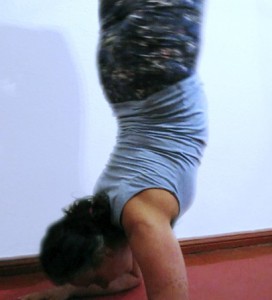It was quite unexpected one day when I tried to open an article about body positive yoga and was then slapped with a popup for a weight loss ad. Like a slap in the face, I presumed I was going into friendly territory, and then was shamed for it.
“You would look so much better if…”
I proceeded to communicate with the manager of the web-platform (not the same person who wrote the article), to explain to them how these ads are detrimental. He refused to acknowledge my point of view, explaining to me why my feelings were invalid, and his were correct (a clear case of mansplaining). I think I know when I feel shamed. And when a weight-loss ad pops up while I’m trying to read an article about powerful abundantly-bodied yogis, this is exactly what “fat-shaming” is about. And sometimes it’s not so obvious to those doing it: “The shaming may be performed under the guise of helping the person who is overweight/obese realize they need to lose weight or they will die, become ill, and/or never succeed in life or relationships.” I should not have to be reminded of the so-called beauty standards outlined by mainstream media when I’m trying to find solidarity in connecting to my body with positivity. The term “weight-loss” is grammatically “negative” in and of itself. But I don’t want to dwell on semantics. Body Positivity is about connecting to one’s own body the way it is right now, loving it, owning it; whether that body fits mainstream standards of ability, size, skin colour, gender, or not. Body Positivity is about disregarding the propaganda that capitalism wants to sell us through whatever new trend of the day is, and just being present and accepting our bodies for what they are. In my opinion, the hottest people are the ones who are able to do that, they shine from the inside – they glow with bliss and love of their own bodies. It’s powerful and inspiring.

Unhealthy weight-loss
“Body positivity and the wish to lose weight go hand-in-hand…”
Obviously this guy knows nothing about body positivity, nor has any experience about the wish to lose weight. As a female-socialized person who never fit into any beauty norms, I can attest to the experience that I never felt less at home in my body than when I wished to lose weight, nor did I feel any more positive about my body than when I did actually lose weight. Now, at the heaviest I am in my life, I feel the most at home, the most happy. I look in the mirror, and I say “look at that hottie!” About 8 years ago I was on a strict diet that was supposed to alleviate the painful symptoms I had from endometriosis. I lost a lot of weight very quickly, I was 20 kilos less than I am now – in the so-called BMI ‘normal’ weight range, even though my ribs were sticking out. But my immune system got depleted and I kept getting sick. And the symptoms continued to perpetuate. According to the BMI, today I would be classified as ‘obese.’ But I have no desire to lose ‘weight.’ The mass my body has is mostly composed of thick muscle and strong bones. Yeah, I have some fat around my middle, I enjoy a few beers now and then. But according to my doctor, I am very healthy for my age. And I don’t lose connection to my breath while I’m both demonstrating as well as talking through the approximately 30 chaturungas in my yoga classes, as well as practice handstand, and forearm stand regularly. I hardly ever get sick these days. I’m flexible, strong, commute by bicycle and move easily in my own body. If I lost weight, I’d lose muscle and strength. The BMI is a load of bollocks.

Moving up to Scorpion pose
Look at these athletes, how strong they are… I’m sure some of them would be classified as obese. If you slapped them with a weight-loss ad, they’d scoff in your face! I don’t think that losing weight should be a goal for anyone. Especially when it means that some people can take this concept to the extreme and develop eating disorders. I can get behind the idea of being healthy, but at cost to whom? And what’s in it for someone who runs some random web platform to tell others what they should or should not do with their own bodies?
“You should eat healthy…”
The manager of the website went on to explain to me that many of their “readers have a long history of health related issues where many of them are related to unhealthy diets and eating habits.” Firstly, I don’t know how he could know this, he’s judging his readers based on analytics and statistics from what they click on. Just because someone falls prey to the latest weight-loss trend does not mean they have ‘unhealthy diets’ or are even ‘overweight.’ Both of these concepts are based on culturally-constructed marketing concepts sold to us by multi-million dollar companies. Secondly, even using the term ‘healthy’ for food is ridiculous. How can something that is dead be ‘healthy’? Okay, sometimes people eat food that is not dead, but most of us will eat dead and / or processed plants or animals. ‘Healthy‘ refers to an organic material, plant or animal, that is alive and thriving. When we eat, our bodies take nutrients from what we consume, not ‘health.’ One could say that “Kale is nutritious” because it contains a lot of nutrients that human bodies need to remain healthy. But so does a bag of chips and a glass of beer! I just found out about this trend in Berlin called BierYoga, I’m all for it! Why not bring together two things you’re passionate about? I’ve heard some German yogis say that they will never drink beer because it gives them a thick belly. As the old school yogis proudly display their beer bellies, these westerners fall prey to capitalist vanity. I myself don’t see the point of such restrictions, and want to enjoy my life with a few beers now and then. And I will rock my belly in a bikini, despite your jealous sneers. Yes, I do think that fat-shaming comes from a place of jealousy over the fact that this ample-bodied person allows themselves to indulge in the enjoyment of eating and drinking, and the one watching their waistline places themselves in a prison of calorie-counting and latest diet fads. Who’s the one with the ‘unhealthy’ eating habits here? It’s not so easy to say, is it?
“Emotional over-eating is the cause of obesity …”
Some people, no matter how careful they are with what they eat are still unhealthy, and those who just eat whatever they want whenever they want are very healthy, like myself. Emotional over-eating is not the problem. And I would even venture to say that emotional over-eating may stem from the very thing you keep pushing at people. Mainstream beauty ideals tend to alienate more people than they include. Weight-loss ads just create more eating disorders than they help people get healthier. Contemporary western society is so food-obsessed that we’ve lost track of what food can do for us as social human beings and how we can connect to each other. People are constantly counting calories, worrying about whether what’s in their food is GMO or contains this preservative or that salt, or whether something is deemed as organic or fits in with the latest hipster trend and makes them look cool. I fear that people don’t enjoy their food anymore, that it’s become a status symbol, something to post on Facebook. I’ve heard people say “at our age, we have to leave more on our plates” when ordering at restaurants. So… what happens to the food on your plate? It gets tossed in the garbage. This just emphasizes your status as a wealthy person who can afford to order a lot of food, and then not eat it, because you’re ‘trying to keep slim.’ This makes me so angry when I see food go to waste. Food should *not* be a status symbol. In most places of the world, people eat what they can get their hands on. They cherish the food that they have available to them, because there IS nothing else. I grew up with food as a social tradition. We would gather around a feast. Food was important to keeping our culture thriving, and over-eating was a sign of respect. And we would never, ever leave food on our plates. If we couldn’t eat it all, we would put it away as leftovers for the next day, because there was a time when my family remembered having very little or nothing to eat and they didn’t want to go through that again. In South Korea, over-eating is one of the most popular things to marvel at – it has become a kind of sporty entertainment! And here in the west, we’re ‘counting calories.’ Except for the lower-income people who don’t have access to fresh produce. Could these so-called ‘food deserts‘ be the cause of obesity in the United States? These are also often in places where city folk don’t venture to go, there are no yoga studios in a lot of these lower-income regions, no soccer fields, no cooking classes. People are struggling for survival in a society that deems them under class, they don’t have time to count calories or the money to buy better food.
“Obesity IS the cause of many illnesses our society is suffering…”
The capitalist machine has invented a fear of ‘fatness’ to sell us overly-priced food and weight-loss regimes. The capitalist machine has also invented fast food, deep fryers and over-sweetened our cereal, so that they can feed the machine, shower us with images of what we should look like and sell us back weight-loss regimes. It’s a well-thought out campaign to keep profits high and consumers feeling shitty about how they look. This is the reason why weight-loss ads earn money for web platforms like this one I went to. The manager claimed that he would like to represent diversity, but he wants to keep the website going. Yup, weight-loss ads sell, and diversity makes you no income, because it is revolutionary and counters capitalistic devices. I’m not going to disagree that a lot of excess fat in the body contributes to heart disease and limited mobility. But people get heart disease who are slimmer as well, and limited mobility can be caused be a lot of different reasons. When I was attending the first module of the yoga therapy teacher training program, the teacher, who’s also a practicing orthopedist, asked us if anyone knew what the main reason for bad knees was. A fellow student piped up, believing that obesity was the cause. He shook his head, ‘no,’ and said that’s one of the most common misconceptions. Yes, people who carry around extra weight, like myself, stress their knees more than smaller people. But that can actually create more strength in the knees, because of the pressure on the bones. Time and again, with every illness in the body, he kept referring to “too much sitting” as the most common cause of illness in our society.
Advertisers feign interest in people’s health in order to make more money for themselves. They don’t actually care about the health of other people. If they did, they’d stop shoving images of plastic unattainable bodies at us, fast food and weight-loss campaigns. If you really want to help people get more healthy, you’d actually go into lower-income communities and open up community kitchens with affordable nutritious food, cooking classes, economically-accessible exercise programs and community events that get people interacting with each other and moving around. Reduce the workweek, so people spend less time sitting at desks. Provide everyday office activities that everyone would enjoy – going for a walk or lunchtime yoga. Weight-loss ads only benefit those who are selling the ads, nobody else. Body Positivity is about enjoying yourself, your body, how it is now. My interpretation of mindful eating is rather than a selfish and vain approach of ‘watching what you eat’, to enjoy and be thankful for what I have to eat, and to recognize the connection between all of us on the planet through food.
Juli teaches Community Yoga classes in Berlin, with a focus of creating space for those who feel marginalized by mainstream yoga, offering classes both in German and English. Juli offers two weekly Vinyasa Flow yoga classes at our English yoga Kreuzberg studio.
—









